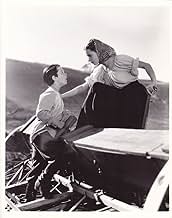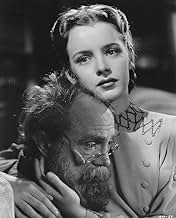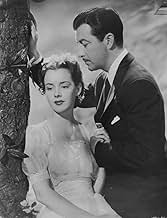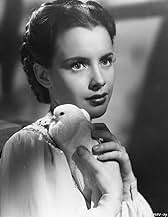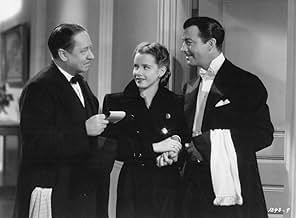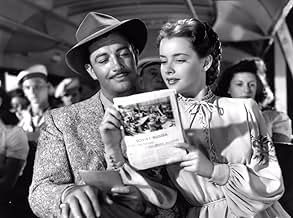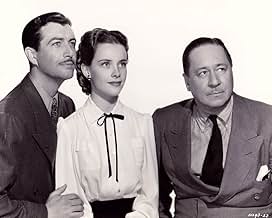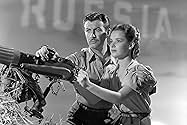Ajouter une intrigue dans votre languePropaganda film from WW2, designed to raise the awareness of the American public regarding USSR's fight against Nazi Germany.Propaganda film from WW2, designed to raise the awareness of the American public regarding USSR's fight against Nazi Germany.Propaganda film from WW2, designed to raise the awareness of the American public regarding USSR's fight against Nazi Germany.
- Réalisation
- Scénario
- Casting principal
- Récompenses
- 2 victoires au total
Konstantin Shayne
- Wounded Soldier
- (as Konstantine Shayne)
John Wengraf
- Red Army Commander
- (as John E. Wengraf)
Avis à la une
Revisionist history can prove unfortunate. There is very little that moves along with apparent 'truth' in this film, BUT it was made at a critical time in our history -- a time when it was necessary to create unity between those fighting the horrors of Nazism. No, the film is not a very good one, but it is a formidable piece of history and should be watched with the adult comprehension of the time. And there is absolutely NO EXCUSE for the wreckage wrought by McCarthy-Cohn and their henchpeople during the Red Scare era that destroyed lives!! No excuse at all. As for SONG OF RUSSIA, it should also survive as a reminder of the screen aura of Susan Peters. (As for her true abilities, watch this one and then SIGN OF THE RAM!!) Along with the obvious propoganda about the 'perfect' society of the USSR, the worst part of this film, of course, is the usually awful performance of Robert Taylor, whose post-War attitudes were those of a true coward, as well as a lousy actor.
Like a previous writer, I too saw this movie as a child during World War 11.
I really cannot comment on its artistic value so many years later, however, as a young person ( with my Father overseas)during that point in history, it was something to see to bring closer the effects and personality of war. The one poignant thing about the movie that I still remember clearly was the playing of Tchaikovsky's very famous Piano Concerto #1 in B-Flat. It was my first real introduction to classical music. If nothing else, I am thankful for the film bringing this to me, for it and classical music have played an enormous part in my life ever since! It led me to study music and have been professionally involved in music all my working life. My thanks go to "Song Of Russia" and Tchaikovsky -Doug-
I really cannot comment on its artistic value so many years later, however, as a young person ( with my Father overseas)during that point in history, it was something to see to bring closer the effects and personality of war. The one poignant thing about the movie that I still remember clearly was the playing of Tchaikovsky's very famous Piano Concerto #1 in B-Flat. It was my first real introduction to classical music. If nothing else, I am thankful for the film bringing this to me, for it and classical music have played an enormous part in my life ever since! It led me to study music and have been professionally involved in music all my working life. My thanks go to "Song Of Russia" and Tchaikovsky -Doug-
Look: This film IS propaganda, but it certainly isn't Soviet propaganda. I think it is clear from watching the film disinterestedly and/or reading ALL of the transcripts of Ayn Rand's HUAC testimony that it was American wartime propaganda aiming at 1) strengthening political ties with its then-ally Soviets, and 2) convincing the American's that they should support the joint effort with the Russians against Germany. The US was too afraid to admit to the American people that they, like, Churchill said, had to work with the devil to defeat Hitler; they used propaganda film instead (ad not just here, but overtly as part of Frank Capra's "Why We Fight" series). Further, I think it is probable, as a previous poster mentioned, that they are only guilty of writing a very ill-conceived "love knows no bounds" kind of war time love story; this is just a year or so after Casablanca, after all! The movie certainly was picked up, partly on the basis of the love-knows-no-bounds angle, but more overtly b/c, as the awful Robert Taylor pointed out in his own HUAC testimony, the request came from the US State department.
I'll be the first to admit that this film was a bald effort at propaganda. I'll also admit that the conditions depicted in Russia were far from reality. However, this isn't the first effort at propaganda by Hollywood, nor is it the first (or the thousandth) that takes a wide berth from reality.
If you look at the movie's setting (happy Russians with a benevolent leader) as fantasy, and imagine the Russia shown in the movie as a mythical nation, then you have a dandy story here. Propaganda aside, the storyline here is excellent; it's engrossing, well-written and intelligent. The acting is superb, from top stars Taylor and Peters down to the bit players and extras. The dance scenes are well choreographed.
The music, mostly that of Tchaikovsky, is superb, and the soundtrack is masterfully woven into the background throughout the story. The music is well-played and well conducted by Albert Coates (who also did the piano work). As for the piano, Susan Peters does a good job of finger placement that could fool all but the trained eye into thinking that she could actually play the piano (she couldn't at the level shown in the movie). The one fault herein is Taylor's attempts to imitate a conductor: suffice it to say that it's out of sync and overstated to the point of absurdity.
As a side note, many of the members of the Peter Meremblum orchestra (prodigal young musicians, many of whom went on to careers in music, and a few of whom became very well-known in the world of music) appear throughout the movie, mainly as extras and as kids in the village and youths in the Moscow Conservatory. The orchestra also performed some of the background music.
All in all, this is an excellent movie if one can overlook the propaganda and anti-realism and treat it as a fantasy/fiction.
If you look at the movie's setting (happy Russians with a benevolent leader) as fantasy, and imagine the Russia shown in the movie as a mythical nation, then you have a dandy story here. Propaganda aside, the storyline here is excellent; it's engrossing, well-written and intelligent. The acting is superb, from top stars Taylor and Peters down to the bit players and extras. The dance scenes are well choreographed.
The music, mostly that of Tchaikovsky, is superb, and the soundtrack is masterfully woven into the background throughout the story. The music is well-played and well conducted by Albert Coates (who also did the piano work). As for the piano, Susan Peters does a good job of finger placement that could fool all but the trained eye into thinking that she could actually play the piano (she couldn't at the level shown in the movie). The one fault herein is Taylor's attempts to imitate a conductor: suffice it to say that it's out of sync and overstated to the point of absurdity.
As a side note, many of the members of the Peter Meremblum orchestra (prodigal young musicians, many of whom went on to careers in music, and a few of whom became very well-known in the world of music) appear throughout the movie, mainly as extras and as kids in the village and youths in the Moscow Conservatory. The orchestra also performed some of the background music.
All in all, this is an excellent movie if one can overlook the propaganda and anti-realism and treat it as a fantasy/fiction.
"Song of Russia" was never made to accurately portray Soviet peasantry, but rather to enlighten the West of the Anti-Nazi plight of the Russian citizens.Director Gregory Ratoff is no more guilty of tainting the truth for entertainment's sake than were many American directors for their careless, racist portrayal of the "savage" American Indian.
Stalin and Hitler were both maniacal murderers, but in 1943 much less was known of the atrocities these two leaders committed. If Western leaders had known better in 1943, greater efforts should have been made to stop the bloodshed. 20/20 hindsight gives us great power to criticize filmmakers of that period, but what of Roosevelt and Churchill? What did they know, and what did they do about it?
"Song of Russia" was a warning and a call for help.Although Russian peasants weren't as "Americanized" as the film portrays, they did defend their land against the fascists and lost over 20 million people doing it.I enjoyed the film, and yes, I thought the peasants looked a bit well-to-do for the period, but that helped me imagine what we as Americans might have confronted if the Nazis had made it past England and Russia.
Stalin and Hitler were both maniacal murderers, but in 1943 much less was known of the atrocities these two leaders committed. If Western leaders had known better in 1943, greater efforts should have been made to stop the bloodshed. 20/20 hindsight gives us great power to criticize filmmakers of that period, but what of Roosevelt and Churchill? What did they know, and what did they do about it?
"Song of Russia" was a warning and a call for help.Although Russian peasants weren't as "Americanized" as the film portrays, they did defend their land against the fascists and lost over 20 million people doing it.I enjoyed the film, and yes, I thought the peasants looked a bit well-to-do for the period, but that helped me imagine what we as Americans might have confronted if the Nazis had made it past England and Russia.
Le saviez-vous
- AnecdotesDebut of actress Joan Lorring.
- GaffesAlthough the film is set during the Axis invasion of the Soviet Union in 1941, uniforms and equipment shown in both the stock footage and the American-filmed scenes are largely from the period of 1943-44, when the film was made. Of particular note are the helmets and rank insignia which are indicative of this later era.
- ConnexionsFeatured in Red Hollywood (1996)
- Bandes originalesPiano Concerto No.1 in B flat minor, Op.23
(uncredited)
Music by Pyotr Ilyich Tchaikovsky
[Played by Susan Peters on piano, with an orchestra at a rehearsal; Reprised at a concert on tour in Russia, with Albert Coates on piano; Reprised by Peters in a New York concert; Excerpts played often in the score, adapted by Herbert Stothart]
Meilleurs choix
Connectez-vous pour évaluer et suivre la liste de favoris afin de recevoir des recommandations personnalisées
Détails
Box-office
- Budget
- 1 828 000 $US (estimé)
- Durée1 heure 47 minutes
- Couleur
- Rapport de forme
- 1.37 : 1
Contribuer à cette page
Suggérer une modification ou ajouter du contenu manquant



